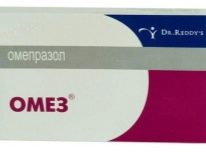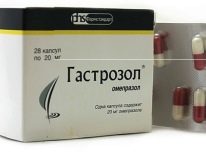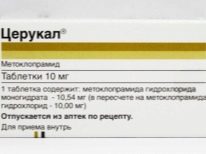Omeprazole for children
Omeprazole is an antisecretory medication prescribed for adults with ulcerative and erosive lesions of the upper digestive tract. It is also often taken as a symptomatic anti-heartburn remedy. But is it possible to give such a drug to children and in what cases?
Release form and composition
Preparations called Omeprazole are made by many Russian and foreign companies. Their name may include a prefix indicating the manufacturer (for example, Omeprazol Zentiva, Omeprazole-Akrikhin, or Omeprazole-Richter), but the active substance in all such drugs is the same. They are represented by enteric and conventional capsules, which are sold in packages of 10 to 100 pieces.
The main ingredient of the drug is also called omeprazole. Its amount in one capsule can be 10 or 20 mg. Additional components of the drug from different manufacturers are sucrose, hypromellose, magnesium carbonate, macrogol, gelatin and other substances.
Their list is important to clarify for patients who are intolerant of any chemical compounds.
Operating principle
The drug in its mechanism of action is a proton pump inhibitor, therefore able to suppress the formation of hydrochloric acid, and also reduces the activity of gastric juice. The therapeutic properties of omeprazole appear after the drug enters the acidic environment of the stomach. Once in this section of the digestive tract, the drug penetrates into the parietal cells, which secrete hydrochloric acid.
Accumulating in these cells, Omeprazole regulates the synthesis of gastric acid components such as hydrochloric acid and pepsin. In addition, the drug has a bactericidal effect on Helicobacter pylori, which additionally helps in the treatment of gastric ulcers.
The action of the capsules begins 1 hour after they are taken and lasts up to 24 hours. The greater the dosage, the more oppressed the parietal cells.
Indications
Omeprazole is used:
- As one of the drugs for the treatment of gastric ulcer or ulcerative lesions of the duodenum 12.
- With Zollinger-Ellison syndrome.
- When gastroesophageal reflux.
- With erosive esophagitis.
- With gastropathy caused by treatment with nonsteroidal anti-inflammatory drugs.
- With hypersecretory disorders of the stomach.
- For the prevention of recurrence of peptic ulcer.
Are children prescribed?
In the annotation to the capsules Omeprazole of most manufacturers there is information that this medicine is not used in childhood. However, in practice, gastroenterologists and pediatricians prescribe Omeprazole to children if they have an acute disease of the upper GI tract. At the same time, patients under 5 years old are given medicine in extremely rare cases and only under the supervision of a physician.
The use of capsules without the appointment of a specialist in children is unacceptable.
Contraindications
Omeprazole capsules should not be given to patients with intolerance to any component, as well as with atrophic gastritis or inflammation of the stomach with a decrease in acidity. That is why without a survey by a gastroenterologist, such medicine may be harmfulrather than help with treatment.
In addition, the drug is not prescribed for liver failure, stomach tumors, gastrointestinal infections or renal failure.
Side effects
When treating omeprazole, dizziness, dry mouth, diarrhea, headaches, flatulence, lethargy, skin rash, nausea and other negative symptoms may occur.
Their appearance should be the reason for going to the doctor and adjusting the dosage or changing the drug.
Instructions for use
Omeprazole is usually taken only once a day. The capsule must be swallowed before breakfast or at the first meal with a glass of water. Open it or chew it should not be. The dose for each child is selected individually, since it is calculated taking into account the patient's body weight. In addition, it will be different for different pathologies of the digestive tract.
The duration of treatment also depends on the diagnosis and can reach several months.
Terms of sale and storage
Capsules containing omeprazole in a dose of 20 mg are sold by prescription, and the drug with a dosage of 10 mg is non-prescription. The shelf life of omeprazole is often 2 or 3 years. While it has not expired, the capsules are kept at a temperature not higher than +25 degrees in a dry place.
It is also important to choose a place for storage of the drug where the capsules will not reach the children.
Reviews
Omeprazole in most reviews is called an effective tool to help with abdominal pain, heartburn and other symptoms of stomach ulcers. According to many parents who gave such capsules to children with gastrointestinal pathologies, the drug acted quickly and was mostly well tolerated.
The advantages of the drug are also called taking once a day and at a low price (for this reason, Omerpazol is often chosen instead of the more expensive Omez).
Analogs
If for some reason it is not possible to give omeprazole to a child, another medicine may be substituted for it, which has the same active substance in its composition. It may be Omez, Gastrozol, Omitox, Ultop or Losek. However, it is forbidden to give children any of these medicines, like Omeprazole, without a doctor's prescription. In addition, some of them are produced not only in capsules, so it is better to entrust the selection of the analog to a specialist who observes the child and will take into account possible contraindications.
In addition, instead of preparations of omeprazole, other medicines can be prescribed for babies with diseases of the digestive tract, for example, Emanera, Zeercal, Zulbeks, Mikrasim, Almagel, De nol or Rabelok. But it is important for parents to understand that such drugs have different active ingredients and a different mechanism of action.
In addition, all such means have age restrictions (for example, Rabelok and Zulbeks are not prescribed for children under 12 years old), therefore their use is possible only after consulting a doctor.
As mentioned above, "Omeprazole" can be used in the treatment of gastritis and other gastrointestinal diseases. About what means and how to properly treat children’s gastritis, you can find out in the next video.

































